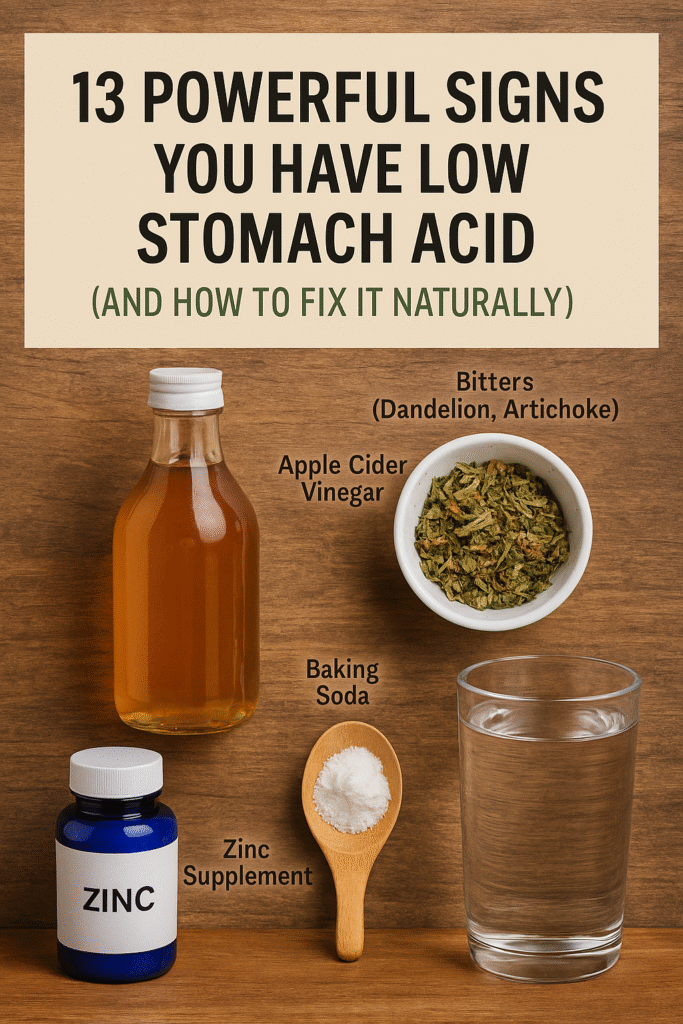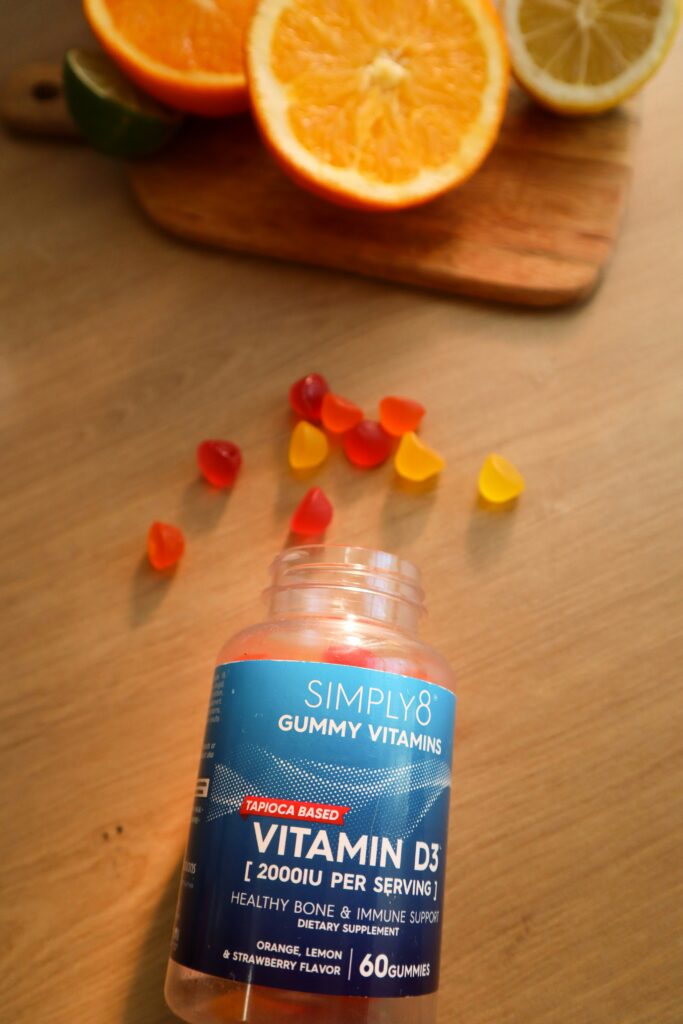
⚠️ Affiliate Disclaimer: This post may contain affiliate links, which means I may earn a small commission — at no extra cost to you — if you make a purchase through one of these links. I only recommend products or services I genuinely trust and believe can provide value. Thank you for supporting My Medical Muse!
13 Powerful Signs You Have Low Stomach Acid
Signs You Have Low Stomach Acid (And What to Do About It)
Do you constantly feel bloated after meals, burp often, or struggle with nutrient deficiencies despite eating well? You might think it’s too much stomach acid but what if it’s too little?
Low stomach acid (hypochlorhydria) is one of the most overlooked causes of digestive issues. And the irony? Its symptoms often mimic those of high acid leading people to pop antacids and make the problem worse.
In this post, we’ll dive deep into what low stomach acid is, why it happens, how to recognize the signs, and what you can do to restore healthy digestion naturally.
Table of Contents:
1. What Is Stomach Acid and Why Is It Important?
2. What Causes Low Stomach Acid?
3. 13 Sneaky Signs You Might Have Low Stomach Acid
4. Common Misdiagnoses: Is It Really Acid Reflux?
5. How to Test for Low Stomach Acid at Home
6. What to Do About Low Stomach Acid (Natural Solutions)
7. Final Thoughts: Heal Your Gut, Feel the Difference
What Is Stomach Acid and Why Is It Important?
Stomach acid, also known as hydrochloric acid (HCl), is a digestive fluid produced in your stomach lining, far from being a bad guy, HCl is crucial for:
- Breaking down food (especially protein).
- Activating digestive enzymes like pepsin.
- Killing harmful bacteria and pathogens.
- Helping absorb nutrients like B12, iron, calcium, magnesium, and zinc.
- Triggering bile release for fat digestion.
When stomach acid is low, digestion slows down, food sits in your stomach longer, ferments, and leads to uncomfortable symptoms that ripple through your entire system.
What Causes Low Stomach Acid?
Several factors can reduce your stomach acid production:
Chronic Stress:
Stress activates the sympathetic “fight or flight” nervous system, which downregulates digestion, including HCl production.
Aging:
After age 30, your stomach acid levels naturally start to decline, by 60, many people have significantly reduced output.
Nutrient Deficiencies:
You need zinc, vitamin B1, and chloride to produce HCl. If you’re low in these, your acid production may drop.
Long-Term Use of Antacids or Acid Blockers:
These drugs may offer short-term relief but suppress acid over time, which can cause or worsen hypochlorhydria.
H. pylori Infection:
This common bacteria can weaken the stomach lining and lower acid levels to survive.
Poor Diet:
Highly processed foods, low-protein diets, or excessive refined carbs reduce your stomach’s need to make acid.
13 Sneaky Signs You Might Have Low Stomach Acid
Wondering if low stomach acid could be affecting you? Here are the most common signs many of which are often mistaken for other problems:
- Bloating and Gas After Meals: Fermentation of undigested food produces gas and bloating especially if it happens within an hour of eating.
- Feeling Full Quickly or Food Sitting Heavily: You eat a small amount but feel overly full. That’s food stagnating due to poor breakdown.
- Frequent Burping: Especially if it happens right after meals, this may be a sign of incomplete digestion.
- Acid Reflux or Heartburn: Ironically, low stomach acid causes the same burning sensation as high acid because undigested food and weak acid back up into the esophagus.
- Undigested Food in Stool: If your body can’t break food down properly, you may see recognizable chunks in your poop.
- Bad Breath (Halitosis): Low acid allows bacteria to thrive and release foul-smelling gases even if you brush well.
- Nutrient Deficiencies: Frequent fatigue, hair thinning, pale skin, or brittle nails may point to poor nutrient absorption from low stomach acid.
- Iron or B12 Deficiency: Both require acid for absorption. Persistent anemia that doesn’t improve with supplements could be a clue.
- Nausea After Taking Supplements: Especially with protein, iron, or zinc, which require strong acid to digest without side effects.
- Weak Nails and Hair: Zinc, protein, and other nutrients needed for growth aren’t absorbed well without sufficient HCl.
- Chronic Fungal Infections or Candida: Your acid is a defense line. If it’s weak, yeast and bad bacteria can overgrow.
- Skin Conditions (Acne, Rosacea, Eczema): Poor digestion and nutrient absorption may inflame the skin from within.
- Low Appetite: Stomach acid triggers appetite hormones. Without it, hunger may fade and nutrient intake drops.
Common Misdiagnoses: Is It Really Acid Reflux?
If you’ve been told you have GERD or heartburn and were prescribed antacids or PPIs like omeprazole take a closer look. Many people assume they have too much acid when they’re actually running low. Here’s how to spot the difference:
Symptom High Acid Low Acid
- Heartburn
- Bloating
- Belching
- Undigested food
- Nutrient deficiency
- Bad breath
If your symptoms include bloating, gas, fullness, and fatigue along with heartburn, you may have low stomach acid not excess.
How to Test for Low Stomach Acid at Home
Here are a couple of simple, safe home tests you can try:
1. The Baking Soda Test (Burp Test):
How to do it:
- Mix ¼ tsp baking soda in 4 oz cold water.
- Drink it first thing in the morning before food.
- Time how long it takes to burp.
Results:
If you burp within 2-3 minutes: likely normal acid, if it takes longer or you don’t burp at all, it is possibly low stomach acid. Not 100% reliable, but a helpful clue when paired with symptoms.
2. The Betaine HCl Challenge:
This involves taking 1 capsule of Betaine HCl with pepsin before a protein-heavy meal. If you feel warm in your chest, burning, or discomfort you may not have low acid. If you feel nothing, your stomach acid may be low.
Consult a professional before using HCl regularly, especially if you have ulcers, are on meds, or have GI disease.
What to Do About Low Stomach Acid (Natural Solutions)
So what’s the fix? Thankfully, there are several ways to support healthy acid production naturally:
1. Chew Your Food Thoroughly: Digestion starts in the mouth, chewing more signals your stomach to get ready including producing acid.
2. Add Apple Cider Vinegar Before Meals: Mix 1 tablespoon of raw ACV in a little water and sip it 15 minutes before meals. It helps acidify the stomach and improve digestion.
3. Eat Bitters: Bitter herbs like dandelion root, gentian, and artichoke leaf stimulate stomach acid and bile flow. Look for digestive bitters drops or teas.
4. Don’t Drink Too Much Water With Meals: Large amounts of fluid can dilute stomach acid. Sip, but avoid chugging water with food.
5. Reduce Stress: High cortisol, low stomach acid. Try deep breathing before meals, mindfulness, or short walks.
6. Eat Protein at Every Meal: Protein stimulates the release of gastrin, a hormone that tells your stomach to make acid.
7. Use Zinc and B Vitamin Supplements: If you’re deficient, these can help restore HCl production. Try adding zinc carnosine or a B-complex under medical supervision.
8. Consider Betaine HCl Supplementation:
When guided by a practitioner, this can safely restore acid levels and improve digestion over time.
9. Fix Gut Dysbiosis and H. pylori:
If overgrowths are present, you may need antimicrobials (natural or prescription) to reset your gut ecosystem.
Also Read: Gut Dysbiosis
Final Thoughts: Heal Your Gut, Feel the Difference
Low stomach acid is the hidden root of countless health problems from bloating and gas to chronic fatigue and nutrient deficiency. The good news? It’s often reversible. By tuning into your body, adjusting your habits, and taking the right steps, you can restore your gut function and finally start digesting and feeling better. Don’t ignore your symptoms, the fix could be as simple as giving your stomach acid the attention it deserves.
👩⚕️ Need Personalized Health Advice?
Get expert guidance tailored to your unique health concerns through MuseCare Consult. Our licensed doctors are here to help you understand your symptoms, medications, and lab results—confidentially and affordably.
👉 Book a MuseCare Consult Now

